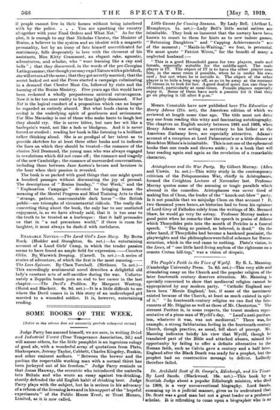The People's Faith in the Time of Wyclif. By B.
L. Manning. (Cambridge University Press. 7e. 6d. net.)—This very able and stimulating essay on the Church and the popular religion of the later fourteenth century deserves attention. Mr. Manning is specially concerned to show that mediaeval religion cannot be appropriated by any modern party. "Catholic England may have been Merrie England,' but, if some of the merriment existed because of the Church, at least as much existed in spite of it." "In fourteenth-century religion we can find the fore- runners of Mr. Stiggins as well as those of Mr. Chesterton." The sternest Puritan is, in some respects, the truest modern repre- sentative of a pious man of Wyclif 's day. "Laud's anti-puritan- ism, whatever it was, was not mediaeval." There was, for example, a strong Sabbatarian feeling in the fourteenth-century Church, though practice, as usual, fell short of precept. Mr. Manning indicates briefly his view that Wyclif, though he translated part of the Bible and attacked abuses, missed his opportunity by failing to offer a definite alternative to (he Roman faith, such as Calvin gave a century and a half later. England after the Black Death was ready for a prophet, but the prophet had no constructive message to deliver. Lollardy therefore failed.


































 Previous page
Previous page